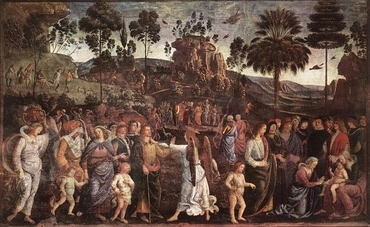4290. In the internal historical sense 'he said, I will not let you go unless you bless me' means that they insisted on being representative, for being insistent is meant by 'I will not let you' and the representative of the Church by 'being blessed'. This particular matter - the insistence of Jacob's descendants that they should be representative of the Church, though they were no more the elect than any other nation - is not very clear, it is true, from the historical narratives of the Word contained in the sense of the letter. It is not clear because those narratives hold the arcana of heaven within them, which accordingly follow one another in a connected sequence, and also because the actual names there are used to mean spiritual realities, many of which names indeed are used in the highest sense to mean the Lord. Examples of these are Abraham, Isaac, and Jacob, who mean in the highest sense the Lord, as has been shown many times in what has gone before; see also 1965, 1989, 2011, 3245, 3305 (end), 3439.
[2] The fact that Jacob's descendants were not the elect, yet they insisted that the Church should have its existence among themselves, may be seen from the internal historical sense in many places in the Word, openly so in the following statements in Moses,
Jehovah said to Moses, Go up from here, you and the people which you made to go up out of the land of Egypt, into the land which I swore to Abraham, Isaac, and Jacob, saying, To your seed I will give it. I will not go up in your midst, for you are a stiff-necked people, lest I consume you on the way. When the people heard this bad news, 1
they mourned and took off every one his ornament from upon him. And Moses took a tent and pitched it for himself outside the camp, far away from the camp. Moses said to Jehovah, See, You say to me, Make this people go up, when You have not made known to me whom You will send with me. Now therefore, if, I pray, I have found favour in Your eyes, make known to me, I pray, Your ways, so that I may know of You, that I have found favour in Your eyes. See also that this nation is Your people. He said therefore, My presence will go [with you], until I give you rest. Exodus 33:1, 3-4, 7, 12-14.
In this chapter of Exodus it is said that Moses made the people go up out of Egypt and then that they took off their ornaments and mourned, and that Moses pitched the tent outside the camp and that Jehovah gave His assent. This shows plainly that they themselves were insistent.
[3] In the same author,
Jehovah said to Moses, How long will this people provoke Me? And how long will they not believe, for all the signs which I have performed in their midst? I will strike them down with pestilence and annihilate them, and I will make you into a nation greater and mightier than they are. But Moses entreated Jehovah, who being appeased said, I will be gracious according to your word. But yet, I am the living One, and all the earth will be filled with the glory of Jehovah; for as for all the men who have seen My glory and My signs which I performed in Egypt and in the desert, and despite this have tempted Me these ten times and have not obeyed My voice, they will not see the land which I swore to their fathers; all who provoke Me will not see it. In this desert will your bodies fall, but I will bring in your children. Numbers 14[11-13, 20-23, 29, 31].
From these verses also it is evident that Jehovah was willing to annihilate them and therefore not to establish the Church among them, but that they insisted it should be established among them, and therefore it was done. And there were many other occasions besides this when Jehovah would have wiped out that repeatedly rebellious nation but repeatedly He allowed Himself to be appeased by their entreaties.
[4] The same is also implied by the fact that Balaam was not allowed to curse that people, in 22 Chapters, 24 of Numbers; in addition to other places where it is said that Jehovah repented of having brought that people in; also that Jehovah was appeased, as well as that He repeatedly made a new covenant with them. These are the kinds of things that are meant in the internal historical sense by the words 'I will not let you go unless you bless me'. Something similar is also meant by Jacob's taking the birthright from Esau as well as taking the blessing by deceit from him, in Chapters 25, 27 of Genesis.
Footnotes:







